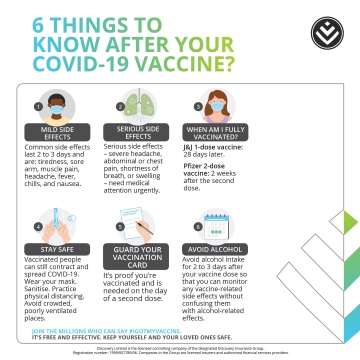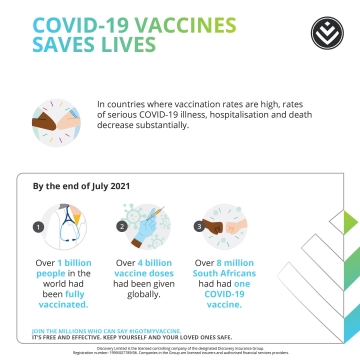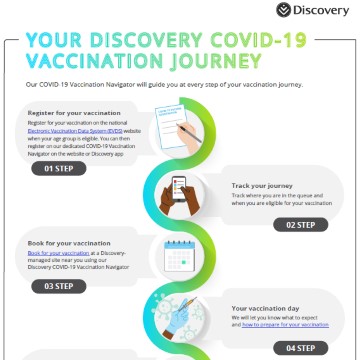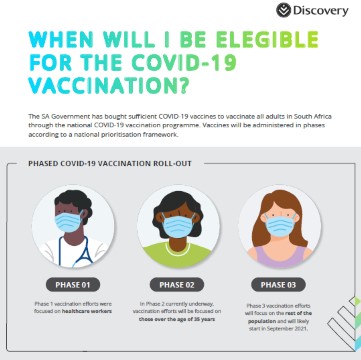

Novel Coronavirus (COVID-19)
As a valued member of Bankmed, our number one priority during the COVID-19 pandemic is to keep you and your loved ones informed, safe and most importantly covered!
Our partnership with our administrator, Discovery Health, promises to stand us in good stead during the vaccination journey. Discovery is best placed to play an active role in the vaccine rollout and Bankmed is on board in the best interest of our members, and for the overall social good that our collaborative efforts will generate.
To ensure an agile and consistent vaccine rollout, Discovery will drive phase two, and this will be accompanied by communication to all members of the medical schemes administered by Discovery Health, including Bankmed members. The vaccine registration process will be Discovery branded and all communication will be disseminated through their Discovery branded member journey portal.

Discovery COVID-19 Vaccination Navigator
We have created a dedicated portal to support you at every step of your vaccination journey. Your personalised vaccination navigator will help you to:
- Know how to prepare for your COVID-19 vaccination
- Book for your vaccination at a Discovery-managed site near you
- Track where you are in the COVID-19 vaccination rollout
- Create a digital version of your vaccination card for safe keeping
Learn more with infographics
Listen to what doctors have to say
All medical information found on this website including content, graphics and images, is for education and information objectives only. Discovery publishes content to help to promote a better understand of COVID-19 and COVID-19 vaccinations. The content covered is an overview of key concepts and is not exhaustive in nature. We encourage further reading from other credible sources where necessary.
South African organisations:
- National Department of Health's dedicated COVID-19 portal: https://sacoronavirus.co.za/
- National Institute for Communicable Diseases' (part of the National Health Laboratory Service) dedicated COVID-19 hub
- South African Health Products Regulatory Authority (SAPRHA - part of the National Department of Health).
- South African Medical Research Council (SAMRC)
- South African Medical Journal ()
International Organisations:
- Johns Hopkins University
- Harvard Health, Harvard University COVID-19 resource center
- Mayo Clinic COVID-19 resource center
- New England Journal of Medicine (NEMJ)
- US Centers for Disease Control and Prevention (US CDC)
- US Food and Drug Administration (US FDA)
- World Health Organization (WHO)
Your vaccination journey
Our COVID-19 vaccination navigator will guide you through these steps of your journey
Register for your vaccination
Complete the pre-vaccination questionnaire
Get your vaccination
Share your experience
Complete your post-vaccination questionnaire
How are you covered?
We have tailor-made a basket of care to meet the unique needs of our members during this pandemic.
Virtual and Telephonic consultations
As a Bankmed member, you can now consult with your Healthcare Professional in the comfort and safety of your home*.
We offer you a virtual (video call) and telephonic consultation option. The only requirement during this time is to ensure that you and your Healthcare Professional agree on the virtual consultation platform to facilitate this process.
*Plan benefit rules apply. However, telephonic and virtual consultations are reimbursed at lower rates than a face-to-face consultation.
In-and-out of hospital treatment
Bankmed will cover the cost of treatment in- and out-of-hospital if a member is diagnosed as positive for COVID-19 from our Insured (Risk) Benefit.

Diagnostic testing
Bankmed will cover the cost for a COVID-19 test for members across all Plans from our Insured (Risk) Benefit, subject to Diagnostic testing in accordance with the NICD protocol and referral by your Healthcare Professional (regardless of a negative or positive result).

Relaxed network restrictions
Bankmed will waive network restrictions for the COVID-19 condition only so that members have convenient access to all available hospitals, specialists and General Practitioners during this pandemic. The relaxation of network restrictions is specific to COVID-19 because this outbreak requires emergency intervention.
Frequently asked questions
As a valued member of Bankmed, our number one priority during the COVID-19 pandemic is to keep you and your loved ones informed, safe and most importantly covered!
COVID-19 is an infection caused by a type of Coronavirus. The primary means of spread seems to be saliva-droplet based spread. This is similar to the common cold and seasonal flu. COVID-19 appears to be more infectious than the seasonal flu with an infection rate that is 1.5 to 2 times higher than seasonal flu. Reassuringly, however, the vast majority of people who contract COVID-19 experience only mild symptoms, including a potential fever, a cough and shortness of breath.
You can check the live tracker on this illness for updates on confirmed cases. You can also view daily situation reports to keep informed.
The primary symptoms include:
- Fever
- Cough
- Shortness of breath or difficulty breathing
COVID-19 spreads quickly, through:
- Coughing or sneezing - people could catch COVID-19 if they are standing within one metre of a person who has the illness, by breathing in droplets coughed out or exhaled by the ill person
- Close personal contact, such as when shaking hands or touching others
- Touching an object or surface on which the virus is found (after a sick person coughs or exhales close to these objects or surfaces such as desks, tables or telephones), then - before washing the hands - touching the mouth, nose, or eyes
Healthcare Professionals can only treat the symptoms of COVID-19 as they present. No specific therapy is effective against the virus itself. If you meet any of the criteria listed below, you must seek medical care early and share your previous travel history with your Healthcare Professional.
When to seek medical care:
- If you have acute respiratory illness and suddenly have a cough, sore throat, shortness of breath or fever (>=38°C)
- Were in close contact with someone who had a probable or confirmed case of COVID-19 infection
- If you have travelled to areas with presumed ongoing community transmission of COVID-19
- If you have worked in or attended a health care facility where patients with COVID-19 infections were being treated
- If you have been admitted with severe pneumonia of unknown aetiology
People who contract the COVID-19 may take anywhere from one to 14 days to develop symptoms. Even if you have not recently travelled to a COVID-19-affected region, or had contact with an individual who has been affected by the illness, you must still inform your Healthcare Professional if you meet the criteria listed above. A virtual consultation is an excellent way to consult with your Healthcare Professional.
Bankmed, in partnership with our Administrator, has introduced a range of initiatives to support our members during COVID-19. These initiatives included detailed analytics and reporting to identify and understand the risks and needs of our members, new benefits to provide full financial indemnity against COVID-19, initiatives to protect high risk members against the severe effects of COVID-19, home care and monitoring for early detection of signs of deterioration, digital services for remote consultation and doctor support.
As the pandemic has progressed, much like the rest of the world, the healthcare system has experienced high volumes of COVID-19 related admissions, placing significant strain on ICU bed capacity. In regions where the capacity of hospital beds - particularly ICU beds - comes under strain, Bankmed will do everything in our power to ensure that every single member who requires ICU care, receives this at the highest standards. If necessary, this includes contingency planning to transport members to an available ICU bed, where appropriate.
Our Administrator, is working very closely with the private hospital groups; with whom we have longstanding relationships. This includes regular check-ins on the capacity of the private hospitals, and particularly the availability of ICU beds for urgent cases. In the event that ICU bed capacity is seen to be threatened or diminishing to dangerously low levels, we will work with the hospitals, the treating doctors, and the members' families to move members being treated for non-COVID related conditions, to ICUs where sufficient surplus capacity exists. This would serve to free up additional capacity, in the pressurised and overloaded ICUs.
We are optimistic that as a result of the healthcare infrastructure contingencies, and extra resources added during the lockdown, that there will be sufficient healthcare resources to meet the country's and our members' needs. We do, however, encourage preventative and social distancing measures, including reminders of available benefits and services that our members have access to, in the context of the rising infection rate.
As the COVID-19 pandemic progresses, emerging experience from other parts of the world, as well as data highlights the importance for members to understand and manage their health risks during COVID-19.
Want access to rapid COVID-19 testing?
Vaccine successes around the globe
Five reasons why you should have the COVID-19 vaccination
Getting Your Vaccine is Like Getting Your Drivers License
Whats Swiss Cheese got to do with wearing masks
Understanding how Viruses Work Once they are Inside the Body
Bankmed's response is to enhance our COVID-19 basket of care with an additional Hospital at Home benefit. The Hospital at Home benefit was introduced to assist with capacity constraints and to alleviate pressure from the in-hospital setting for members who could be treated safely at home.
The Hospital at Home benefit is open to high-risk members who test positive for COVID-19 and are mildly symptomatic and at risk for hospitalisation. Additionally, had these members been admitted, they would have met the criteria for general ward admission, but not High Care or ICU.
The Hospital at Home benefit consists of two components:
1. Remote Monitoring
Bankmed provides members who require monitoring with daily check-in calls from the remote monitoring system, 24-hour monitoring by the Care team, oversight by the treating Healthcare Professional, and a biosensor patch to remotely monitor vitals and alerts for out of range readings.
1.1 Qualifying criteria:
- High risk patients >35 years with comorbidities +/- obesity who are COVID-19 positive are symptomatic and at increased risk of hospitalisation
1.2 Criteria for GP vs Physician monitoring:
- Based on admitting/referring Healthcare Professional for remote monitoring
2. Hospitalisation in the Home
Bankmed provides members with acute in-patient treatment at home to avoid hospitalisation. This benefit also covers members who are deemed medically stable by their treating provider to be discharged from hospital earlier to continue their treatment at home.
2.1 Qualifying criteria:
- Patients >18 years in Stage 2 COVID-19 infection who meet criteria for hospitalisation
2.2 Criteria for GP vs Physician monitoring:
- For hospitalisation at home only physicians eligible
How does a member access this benefit?
Contact your Healthcare Professional and they will make a decision as to whether you qualify to access this benefit based on the above mentioned criteria. If you do, they will contact Bankmed and begin the preauthorisation process.
For more information call 0800 226 5633 or email enquiries@bankmed.co.za.
Answers to important questions about COVID-19 vaccines
Q: How do we overcome anti-vaccine sentiment and myths around vaccination?
A: It's important that we confront anti-vaccine sentiment - and any misinformation around COVID-19 vaccines - with credible content and well-considered responses. First, the approved vaccines have been developed by big and well-established companies that have been around for decades. They employ thousands of scientists and Healthcare Professionals, and these are the people who have developed the vaccines, giving us a significant sense of the calibre of people who are working on vaccine development.
There are many excellent reasons why these vaccines have been developed so quickly, including unprecedented access to funding, the global priority placed on their development and access to thousands of trial participants. These vaccines have also undergone rigorous testing in every phase of the clinical trial process and been tested across massive groups of participants (up to 60 000 people) once they have reached the phase 3 clinical trial phase. The results of these clinical trials so far demonstrate high levels of efficacy (most well over 90%) and safety.
Keep in mind that COVID-19 vaccines are only approved if two requirements are met:
- The vaccine is safe
- The vaccine is effective
South Africa also has a very strong regulator, namely the South Africa Health Product Regulatory Authority (SAPHRA). This regulator is responsible for approving all medication and vaccines for use in South Africa and conducts an in-depth and extensive scientific and analysis of the safety and efficacy clinical data of all medical products before approving their use in South Africa.
Also, getting vaccinated is a far more 'natural' way of preventing disease than taking other pharmaceutical products.
Q: We will have access to a number of different vaccines. Are they all equal in efficacy?
A: All the vaccines that we will have access to in South Africa are required to meet a minimum standard of efficacy to be effective on a population basis. And, the COVID-19 vaccines that have been approved for use are well above these levels of efficacy, at around 90% for most. Where a two-dose vaccine regimen is indicated, people will receive the same vaccine in the first and second round.
Q: Will it be compulsory to be vaccinated?
A: People cannot be forced to be vaccinated. The COVID-19 vaccine is a medical treatment, and medical treatments cannot be made compulsory. South Africa's constitution protects our rights in this regard and President Cyril Ramaphosa has reiterated this many times. However, people will be strongly encouraged to be vaccinated to protect themselves and those they interact with, whether loved ones or colleagues, or others in the wider community.
Q: Can employers access COVID-19 vaccines themselves and run their own vaccine drives?
A: There are two parts to this answer:
- It's critical that we drive equitable access to vaccination. We must all follow the national rollout plan. This means that all people will have the option to be vaccinated according to where they fall into South Africa's three-phased rollout. In our view, it would be completely unethical and unfair for a young, healthy person to access a COVID-19 vaccine ahead of a healthcare worker, an at-risk person or an older person. Vaccine access cannot be linked to one's socio-economic status or resources. We must follow our country's rollout plan and ensure fair, carefully considered access to vaccines
- Employers cannot legally import COVID-19 vaccines. Until a vaccine is registered in South Africa and unless an entity has a licence to import and distribute this vaccine, it is illegal to import any parallel medical products or vaccines. Additionally, if an employer imported vaccines without the necessary approvals and licences and someone receiving that vaccine experienced an adverse reaction, the consequences for the employer would be dire. We ask that employers work alongside us and our Business for South Africa colleagues to accelerate the procurement of reliable, safe vaccines to all South Africans
Q: Will we need a COVID-19 vaccination each year?
A: We do not know yet. We are not sure how long vaccine-induced immunity will last and what levels of immunity the vaccine will stimulate. We understand short-term efficacy but need more data to understand long-term immunity. We certainly hope that this vaccine will not be needed as frequently as the flu vaccine (which is needed annually due to the speed at which influenza virus variants develop). However, it's important that the data be analysed over the long term before we can answer this question.
Q: How serious are COVID-19 vaccine side effects?
A: We have seen very minor or no side effects in other countries where vaccine rollout process are under way. The most common side effects are some pain around the injection site that lasts a few hours and resolves within a day, as well as other flu-like side effects that also resolve very quickly and are indicative of the immune response taking place.
The more severe adverse events are extremely rare. In most instances, adverse reactions linked to vaccines are far lower than adverse events linked to taking medicines. As evidence of this, latest statistics indicate just 2.8 severe adverse events per million vaccinations for the Moderna vaccine. This means the likelihood of severe adverse events is extremely low and that they are extremely rare.
There will also be health professionals on site at every vaccination centre to immediately manage any potential adverse event that might occur.
Out-of-hospital cover
The WHO Global Outbreak Benefit is available to all members of Bankmed during a declared outbreak period. The benefit covers you for the COVID-19 vaccine as well as a defined basket of care for out-of-hospital healthcare services related to COVID-19.
As part of the basket of care, you are covered for:
- COVID-19 vaccine and the administration of the vaccine
- Screening consultations with a network GP (either virtual consultations, telephone or face-to-face)
- COVID-19 PCR and Rapid Antigen screening tests (only two tests) if referred by your Healthcare Professional, or if referred by a network GP
- A defined basket of pathology tests for COVID-19 positive members
- A defined basket of x-rays and scans for COVID-19 positive members
- Supportive treatment, including medication and at-home monitoring device to track oxygen (pulse oximeter) saturation levels for at-risk members who meet the clinical entry criteria
The Hospital at Home benefit is open to high-risk members who test positive for COVID-19 and are mildly symptomatic and at risk for hospitalisation.
This benefit is available on all Plans and is covered by Bankmed as a Prescribed Minimum Benefit (PMB) without using your day-to-day benefits, where applicable.
Cover is subject to Bankmed's preferred providers (where applicable), protocols and the treatment meeting Bankmed's entry criteria and guidelines. Any recommended treatment and healthcare services that are not included in the basket of care may be covered according to the benefits available on your chosen Plan in line with Bankmed Scheme Rules and clinical guidelines or in accordance with Prescribed Minimum Benefits (PMBs), where applicable.
In-hospital treatment
In-hospital treatment related to COVID-19 for approved admissions is covered from the Hospital Benefit based on your chosen Plan and in accordance with Prescribed Minimum Benefits (PMB) where applicable.
Cover for COVID-19 vaccine
The WHO Global Outbreak Benefit is available to all members of Bankmed during a declared outbreak period. The benefit provides cover for the COVID-19 vaccine as well as a defined basket of care for out-of-hospital healthcare services, related to the outbreak disease.
The COVID-19 vaccine and administration of the vaccine are covered as Prescribed Minimum Benefits (PMB) without using your day-to-day benefits.
All Bankmed members 18 years and older will be covered for the vaccine, in accordance with the prioritisation framework and the three-phase roll-out plan as established by the Ministerial Advisory Committee and National Department of Health.
Getting vaccinated
You will be required to register on the National Department of Health's Electronic Vaccination Data System (EVDS), and make use of one of the accredited vaccination sites. The list of accredited facilities will be published by the National Department of Health.
Bankmed members on all plan types are covered for COVID-19 test. The cost of the test is covered from the Insured Benefits (RISK), as long as the test meets the National Institute for Communicable Diseases (NICD) protocol and you're referred by a Healthcare Professional. You are covered for the test whether the result is negative or positive.
You are also covered for a COVID-19 test if you've received authorisation to go to hospital, as long as a Healthcare Professional refers you.
COVID-19 is diagnosed by taking a sample from your respiratory tract - either your nose, throat or chest.
If you have symptoms of COVID-19 or you may have been exposed to a COVID-19 infection, you need to consult with a doctor. If necessary, they will refer you for testing. Call your doctor or book a virtual consultation rather than going to their consulting rooms first. Online doctor consultations provide a safe alternative to face-to-face consultations for patients and doctors.
The below information aims to provide members with simple guidelines when needing an ambulance or hospital admission for COVID-19.
- If the member needs an ambulance, they must call 0860 999 911 and Netcare 911 will assist.
- Netcare 911 will send a response car to access the member's vitals and based on the outcome they will transport the member to a casualty unit.
- From there, if an admission is needed, Netcare 911 will source bed availability via the Joint Operation Centre (JOC) - all main hospitals are linked via the JOC.
- The member also has the option, if possible, to drive themselves to the closest casualty unit and not have to wait for an ambulance.
- Members must only go to a casualty unit if they are having trouble breathing or have the ability to record statistics which show they are deteriorating. If they are feeling flu-like symptoms, they must make contact with their doctor.
- If their doctor believes an admission is needed, a bed will be sourced. Members will also be transported out of the province to the extent that this is required.
COVID-19 Vaccination Q&A: 12-17 Cohort
Q: When will teenagers (12 - 17 years) be able to register on the EVDS for COVID-19 vaccinations?
A: Vaccination registration for children aged from 12 to 17 will open on Wednesday, 20 October 2021 and vaccinations will start on the same day.
Q: Will my child need to be registered on EVDS before being allowed to be vaccinated?
A: Yes, your child will need to be registered on the Electronic Vaccination Data System (EVDS).
Q: Does my child need to provide proof of identity to get vaccinated?
A: Yes. Your child will need to provide original proof of identification such as a Smart ID card, birth certificate or passport. According to the current rules, you must bring the original identity documents. The ID documents provided at the site should be the same as that used for the child's EVDS registration.
Q: Is this vaccine safe? What assurances can you give me?
A: The Pfizer vaccine that will be administered as a single dose to children who are between the ages of 12 and 17 years has been shown to be safe. Children can experience common side effects such as pain at the injection site (upper arm), tiredness, headaches, muscle and joint pains, fever, and chills. These side effects are common, usually temporary and generally clear up within 48 hours. Cases of myocarditis (inflammation of the heart muscle) and pericarditis (inflammation of the lining outside the heart) have been reported but remain very rare (60 per million vaccinated adolescent males) and are often seen in male adolescents (teens) and young adults. The myocarditis or pericarditis cases can be safely treated. The single dose of the Pfizer vaccine almost eliminates the risk of myocarditis which is mostly associated with the second dose when it does occur.
Q: Will the vaccine be a single or double dose?
A: Children from 12 to 17 years old will receive a single dose of the Pfizer vaccine.
Q: Can I prohibit my child from being vaccinated?
A: The Children's Act empowers a child of 12 years or older to consent to his/her own medical treatment if that child is of sufficient maturity and possesses the mental capacity to understand the benefits, risks, social and other implications of the treatment. Only where a child is not sufficiently mature or does not have the required understanding of the treatment, does a parent, guardian or caregiver of a child need to consent to the medical treatment on behalf of the child. However, the Children's Act also stipulates that a parent, guardian or caregiver of a child may not refuse to withhold such consent by reason only of religious or other beliefs, unless that parent or guardian can show that there is a medically accepted alternative choice to the medical treatment concerned.
Q: Do children need their parents' consent to get vaccinated?
A: No. According to the Children's Act 38 of 2005, children from 12 years old do not need consent from their parents for medical treatment; they can give their own consent. The EVDS will be adjusted so children from 12 to 17 years can register themselves.
A: Discovery vaccination sites require minors to be accompanied by an adult. In addition, the site will require the accompanying adult to complete a simple form onsite, as part of registration to confirm who has accompanied the minor to the site.
Q: Are COVID-19 vaccines safe for pregnant youth?
A: Experts recommend that pregnant and lactating women be vaccinated. In general, COVID-19 vaccines have been clinically proven to protect people from severe illness due to a COVID-19 infection. It's important to understand that, while pregnant women were not included in the initial vaccine trials, subsequently, thousands of pregnant women received COVID-19 vaccines around the globe. So far, vaccines have been shown to be safe and effective in pregnant women and youth and are encouraged.
Q: Will Discovery accept walk-ins or do I have to book?
A: Discovery accepts walk-in vaccinations at all its vaccination sites. You might have to wait a little as we prioritise people who have booked slots ahead of time. We encourage you to book if you are able to.
Q: Can I book an appointment on behalf of a child?
A: Yes, you can book an appointment at a Discovery vaccination site on behalf of a child:
- If you have your child on your Discovery Health plan as a registered dependant, you can book an appointment for them using this link.
- If the child is not registered as a dependant, you may still make a booking. You or the child, if they are old enough, must first create an online profile and then make an appointment using this link.
Q: Can a child book their own appointment?
A: Yes:
- If they are a registered dependant or Bankmed member, they can log in using their own details using this link. If they do not yet have their own login details, they should first register here, and then they'll be able to make an appointment after registering.
- If they are not a registered dependant or Discovery member, they first need to create an online profile and book and appointment by using this link.
Your child will need a cellphone number to be able to create an online profile and book their own appointment. An OTP is sent to this number during the registration process. This can be your number, or their own.


















